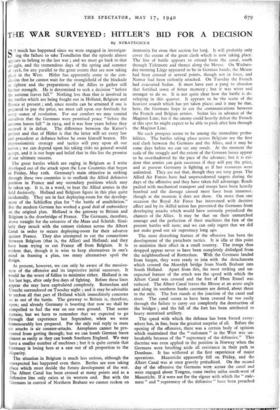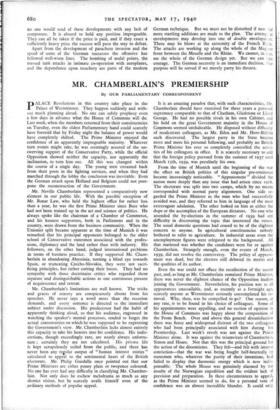THE WAR SURVEYED: HITLER'S BID FOR A DECISION
By STRATEGICUS
0 much has happened since we were engaged in investigat- ing the failure to take Trondheim that the episode almost arears to belong to the last war ; and we must go back to that str .ggle, and the tremendous days of the spring and summer of 1918, for any parallel to the great events that are now taking place in the West. Hitler has apparently come to the con- clu,ion that he cannot wait for the stranglehold of the blockade to tighten and the preparations of the Allies to gather still further strength. He is determined to seek a decision "before the autumn leaves fall." Nothing less than that is involved in the battles which are being fought out in Holland, Belgium and France at present ; and, since results can be attained if one is prepared to pay the price, we must call upon our fortitude for every ounce of resolution. For our comfort we may remind ourselves that the Germans were promised peace "before the autumn leaves fall" in 1914, and it was four years before they secured it in defeat. The difference between the Kaiser's project and that of Hitler is that the latter will set every law and precedent at defiance before he owns himself beaten. His impressionistic strategy and tactics will prey upon all our nerves ; we can depend upon his taking risks no general would ac.2ept, and it is our hope and belief that in this lies the promise of our ultimate success.
The great battles which are raging in Belgium as I write developed out of the attack upon the Low Countries that began on Friday, May loth. Germany's main objective in striking through these two countries is to outflank the Allied defensive position in France and any secondary positions which may be taken up. It is, in a word, to beat the Allied armies in the field decisively. Holland and Belgium figure in this plan quite incidentally. They are in fact deploying-room for the develop- ment of the Schlieffen plan for "the battle of annihilation." But the modern German has worked a good deal of embroidery on the original plan. Holland is the gateway to Britain and Belgium is the drawbridge of France. The Germans, therefore, drove straight for the estuaries of the Maas and Scheldt. Simi- larly they struck with the utmost violence across the Albert Canal in order to secure deploying-room for their advance against France. They also attempted to cut the connections between Belgium (that is, the Allies) and Holland; and they have been trying to cut France off from Belgium. It is evident that, though it is wise to keep alternatives in one's mind in framing a plan, too many alternatives spoil the design.
At present, however, we can only be aware of the massive- ness of the offensive and its impressive initial successes. It would be the worst of follies to minimise either. Holland is on her last legs, after only five days of fighting. Before these lines appear she may have capitulated completely. Rotterdam and Utrecht surrendered on Tuesday night ; and it may be advisable to reckon all that part of Holland which immediately concerns us as out of the battle. The gateway to Britain is, therefore, open; and already Germany is boasting that now we shall be compelled to feel the war on our own ground. That seems certain; but we have to remember that we expected to go through that experience last September, when we were immeasurably less prepared. For the only real reply to mass air attacks is air counter-attacks. Aeroplanes cannot be pre- vented from getting through; but we can bomb German bases almost as easily as they can bomb Southern England. We may have a smaller number of machines ; but it is quite certain that Germany is losing hers at a rate out of all proportion to the disparity.
The situation in Belgium is much less serious, although the unexpected has happened even there. Battles are now taking place which must decide the future development of the war. The Albert Canal has been crossed at many points and as a defensive line only exists at its western end. But with the Germans in control of Northern Brabant we cannot reckon on immunity for even that section for lonk. It will probably only cover the extent of the great clash which is now taking place. The line of battle appears to extend from the canal, south through Tirlemont and thence along the Meuse. On Wednes- day morning Liege appeared to be in German hands, the Meuse had been crossed at several points, though not in force, and Namur had been violently attacked. On Tuesday the French had evacuated Sedan. It must have cost a pang to abandon that fortified town of bitter memory ; but it was wiser and stronger to do so. It is not quite clear how the battle is de- veloping in this quarter. It appears to be the scene of the heaviest assault which has yet taken place; and it may be that, here, the Germans hope to cut the communications between the French and Belgian armies. Sedan lies in advance of the Maginot Line; but if the enemy could heavily defeat the French at this spot he might expect to be able to push after him through the Maginot Line.
No such prospect seems to be among the immediate proba- bilities. The battles taking place across Belgium are the first real clash between the Germans and the Allies, and it may be some days before we can see any result. At the moment the scale of the struggle and the extent of the German losses appear to be overshadowed by the pace of the advance; but it is evi- dent that armies can gain successes if they will pay the price, and at present Germany is fighting as if her resources were unlimited. They are not that, though they are very great. The Allied Air Forces have had unprecedented targets during the days of the offensive and they have taken full advantage. Roads packed with mechanical transport and troops have been heavily bombed and the damage caused must have been immense. though at the moment it does not show. On more than one occasion the Royal Air Force has intervened with decisive effect and by its skilful action has prevented the Germans from developing attacks which would have seriously prejudiced the chances of the Allies. It may be that on their unmatched courage and the perfection of their machines the fate of the present battles will turn; and we can only regret that we did not make good our air supremacy long ago.
The most disturbing feature of the offensive has been the development of the parachute tactics. It is idle at this point to minimise their effect in a small country. The troops thus dropped appear never to have been completely dislodged from the neighbourhood of Rotterdam. With the Germans landed from barges, they were ready to join with the detachments which crossed the Moerdyk bridge from North Brabant into South Holland. Apart from this, the most striking and un- expected feature of the attack was the speed with which the Albert Canal was crossed and the fort of Eben Emael was reduced. The Albert Canal leaves the Meuse at an acute angle and along its southern banks casemates are dotted, about three to the mile. The fort stands at the junction of the canal and river. The canal seems to have been crossed far too easily through the failure to carry out completely the destruction of the bridges ; and the fall of the fort has been attributed to heavy motorised artillery.
The speed with which the defence has been forced every- where has, in fine, been the greatest surprise of all. Before the opening of the offensive, there was a certain body of opinion which maintained that the "stalemate " in the West was un- breakable because of the "supremacy of the defensive." This doctrine was even applied to the position in Norway when the Germans were brushing aside all resistance in their path to Dombaas. It has withered at the first experience of major operations. Maastricht apparently fell on Friday, and the Albert Canal was at once gravely prejudiced. On the second day of the offensive the Germans were across the canal and were engaged about Tongres, some twelve miles south-west of Maastricht. If it were not for the vigour with which the " stale- mate " and "supremacy of the defensive" have been preached no one would read of these developments with any lack of composure. It is absurd to hold any position impregnable. They can all be taken if the price is paid, and if they exact a sufficiently heavy price the success will pave the way to defeat.
Apart from the development of parachute invasion and the speed of some of the German successes the offensive has followed well-worn lines. The bombing of nodal points, the massed tank attacks in intimate co-operation with aeroplanes, and the dependence upon treachery are parts of the modem German technique. But we must not be disturbed if new :,nd more startling additions are made to the plan. The attempt at envelopments may develop into one of double envelopmr_nt. There may be blows at the extremity of the French Ri ht. The attacks are working up along the whole of the Mag:not front between the Moselle and the Rhine. We cannot, in fact, see the whole of the German design yet. But we can take courage. The German necessity is an immediate decision. Our purpose will be served if we merely parry his thrusts.



































 Previous page
Previous page